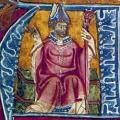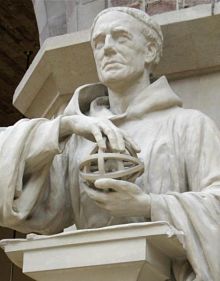231. Origin of Species: Roger Bacon
Posted on
Roger Bacon extols the power of science based on experience and uses a general theory of "species" to explain light and vision.
Themes:
Further Reading
• T. Crowley, Roger Bacon: the Problem of the Soul in his Philosophical Commentaries (Louvain: 1950).
• J. Hackett, Roger Bacon and the Sciences (Leiden: 1997).
• D.C. Lindberg, Roger Bacon’s Philosophy of Nature (Oxford: 1983).
• T.S. Maloney (trans.), Roger Bacon: On Signs (Toronto: 2013).
• G. Molland, “Roger Bacon and the Hermetic Tradition in Medieval Science,” Vivarium 31 (1993), 140-60.
• A. Power, Roger Bacon and the Defense of Christendom (Cambridge: 2012).







Comments
Equivocation
"Bacon is unhealthy" is an excellent example of a sentence which is equivocal with itself
"Species"
Is Bacon's odd use of the term due to a translation of Aristotle's "eidos" when it is now usually rendered as "form"? It would be interesting if these thinkers did not see a real ambiguity in the term.
In reply to "Species" by Justin Vlasits
Species
No, I don't think so actually - it seems to be based on translations from Arabic, if anything. There's some discussion of this in Lindberg's introduction inRoger Bacon’s Philosophy of Nature if you can track that down.
Mongolian Bookies
My favourite fact about Roger Bacon is that he put the spectacular expansion of the Mongol Empire, something that more or less coincided with his own life, down to their fortune telling abilities. He thought that the use of Mongol, Turkic, Chinese, and Islamic methods of divination in combination gave them the special insight they needed to prevail in their battles.
It seems to me that the statement accords very nicely with Roger's understanding of astrology. It's not so much that the Khans learned the truth through access to cutting-edge magic techniques, but that the multiple methods allowed them to triangulate results, thus coming up with more accurate probabilities than anyone else. They were more like a modern gambling corporation, analysing vast amounts of data to come up with the best odds.
Add new comment